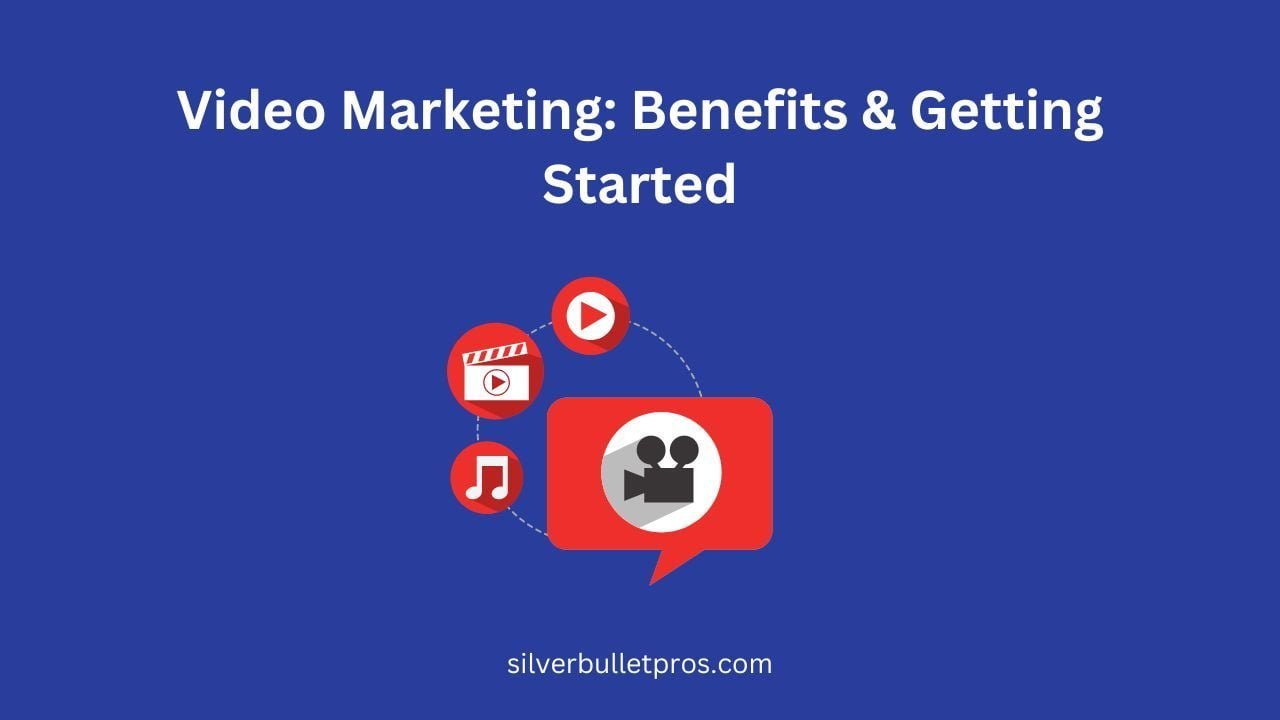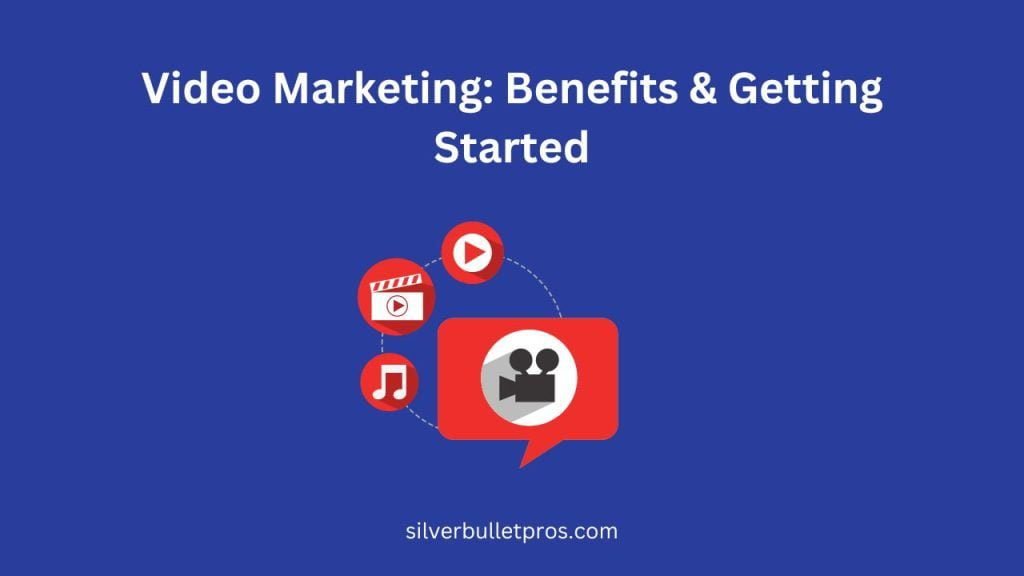

Imagine explaining something complex in a way that keeps people glued to their screens, entertained and informed. That's the magic of video marketing! In this guide, we'll break down everything you need to know to get started with video marketing, from understanding its power to creating your first video.
What is Video Marketing?
Video marketing is a strategy that uses video content to promote a brand, product, or service. It's like having a tiny TV show starring your business, but way more interactive and accessible. You can share these videos on your website, social media platforms, and even email them directly to potential customers.
Benefits of Video Marketing:
There's a reason why video marketing is exploding in popularity. Here are some of the key benefits you can expect to reap:
- Boosts Engagement: Videos are captivating. Studies show that people are 4 times more likely to watch a video about a product than read about it [Source: Wyzowl, 2023].
- Improves Brand Awareness: Eye-catching visuals and captivating stories help people remember your brand better.
- Increases Conversions: A well-crafted video can explain your product or service in a clear and concise way, leading viewers to take action, like buying something or subscribing to your newsletter.
- Boosts SEO: Search engines love video content! Including videos on your website can increase your website ranking and drive more organic traffic.
- Builds Trust and Credibility: Videos allow you to connect with your audience on a personal level, fostering trust and establishing your brand as an authority.
How to Get Started with Video Marketing:
Don't worry, you don't need a Hollywood budget to get started with video marketing. Here's a simple roadmap:
- Define Your Goals: What do you want to achieve with your videos? Increase brand awareness? Drive sales? Once you know your goals, you can tailor your video content accordingly.
- Know Your Audience: Who are you trying to reach? Understanding your target audience will help you create videos that resonate with them.
- Plan Your Content: Brainstorm video ideas that align with your goals and target audience. There are many video formats to explore, from explainer videos to customer testimonials.
- Keep it Simple: You don't need fancy equipment to create great videos. Start with your smartphone and some good lighting.
- Focus on Quality Audio: Even a low-budget video can be effective with clear and crisp audio.
- Promote Your Videos: Once your video is created, don't just let it sit on your website. Share it on social media, embed it in blog posts, and consider video advertising options.
Types of Video Marketing Campaigns:
The beauty of video marketing is its versatility. Here are some popular video campaign types:
- Brand Awareness Videos: These videos introduce your brand and its story to a wider audience.
- Product Demos & Explainers: Showcase your product's features and benefits in an engaging way.
- Customer Testimonials: Let your happy customers sing your praises and build trust with potential customers.
- Educational Videos: Share valuable information and establish yourself as a thought leader in your industry.
Video Marketing Tip
- Keep it Short & Sweet: People have short attention spans, so aim for videos under 2 minutes.
- Strong Call to Action: Tell viewers what you want them to do after watching your video.
- Optimize for Mobile: Most video content is consumed on mobile devices, so ensure your videos are mobile-friendly.
- Add Captions & Transcripts: Make your videos accessible to everyone, including those with hearing impairments or those watching in a loud environment.
Deep Dive
Now that you've grasped the basics, let's explore some advanced video marketing concepts:
- Video Marketing Trends and Statistics: Stay updated on the latest trends in video marketing to keep your content fresh and effective.
- Video Marketing for Different Industries: Explore how video marketing can be tailored to specific industries like healthcare, e-commerce, or education.
- Video Marketing for Different Business Models: Whether you run a B2B or B2C business, video marketing can be a powerful tool.
- Measuring and Tracking Video Marketing Performance: Use video analytics to understand how your videos are performing and make adjustments as needed.
- Video Marketing and Social Media: Leverage the power of social media platforms to share your videos and reach a wider audience.
- Different Video Marketing Strategies: Explore various video marketing strategies, like video marketing for thought leadership or e-commerce.
- Creating Engaging Video Content: Focus on storytelling, high-quality production, and clear messaging to captivate your audience.
- Optimizing Videos for Search: Implement SEO best practices for video content to improve visibility and rankings on search engines.
- Using Influencers in Video Marketing: Partner with influencers to expand your reach and add credibility to your brand.
- Video Marketing on a Budget: Discover cost-effective ways to produce and promote videos without compromising on quality.
- Emerging Technologies in Video Marketing: Stay ahead of the curve by incorporating new technologies like AR, VR, and interactive videos into your strategy.
- Future Trends in Video Marketing: Keep an eye on upcoming trends to ensure your video marketing strategy remains innovative and competitive.
How to measure video marketing effectiveness?
Analyzing video analytics is crucial. By tracking metrics like views, engagement rates, click-through rates, and conversion rates, you gain insights into audience behavior, allowing for data-driven adjustments to your strategy.
What are budget-friendly ways to produce quality videos?
Several cost-effective methods exist, such as DIY approaches using affordable equipment and software, repurposing existing content, leveraging user-generated content, or collaborating with local creators who may offer competitive rates.
Tips for optimizing videos for search engines?
Optimization involves incorporating relevant keywords strategically into video titles, descriptions, and tags. Providing accurate transcripts or closed captions also improves accessibility and searchability. Promoting videos through social media channels can further enhance visibility.
Role of influencers in video marketing?
Influencers play a pivotal role in expanding reach and fostering authenticity. By partnering with influencers whose audience aligns with your target demographic, you can leverage their authority and credibility to increase brand awareness and engagement.
What emerging tech enhances video marketing?
Emerging technologies like augmented reality (AR), virtual reality (VR), and interactive videos offer immersive experiences that captivate audiences. Incorporating these technologies into your strategy can differentiate your brand and create memorable interactions with consumers.
What are the key benefits of video marketing for my business?
Video marketing boosts engagement, enhances brand visibility, improves SEO rankings, and can lead to higher conversion rates.
How do I create an effective video marketing strategy?
Define your goals, know your target audience, plan your content, choose the right platforms, and create a consistent posting schedule.
What types of videos should I produce for maximum engagement?
Produce a mix of explainer videos, product demos, customer testimonials, behind-the-scenes content, and how-to videos.
What tools and platforms are best for video marketing?
Use tools like Adobe Premiere Pro or iMovie for editing, and platforms like YouTube, Instagram, Facebook, and TikTok for sharing.
How can I measure the success of my video marketing campaigns?
Track metrics such as views, engagement rates, shares, conversion rates, and audience feedback to gauge your video's performance.
What are some effective mobile marketing strategies for small businesses?
Effective strategies include optimizing your website for mobile, using social media marketing, creating engaging mobile-friendly content, leveraging SMS marketing, and using location-based marketing to target local customers.
How can I optimize my website for mobile users to enhance marketing efforts?
Ensure your website is responsive, has fast load times, easy navigation, clear call-to-action buttons, and mobile-friendly content to provide a seamless user experience on all devices.
What role do mobile apps play in a comprehensive mobile marketing strategy?
Mobile apps help increase customer engagement, provide personalized user experiences, enable push notifications for direct communication, and offer additional channels for sales and customer support.
How can SMS marketing be leveraged to increase customer engagement?
Use SMS marketing to send timely promotions, updates, reminders, and personalized messages to customers, ensuring content is relevant and concise to drive higher engagement rates.
What are the best practices for mobile ad targeting and personalization?
Best practices include using data analytics to understand user behavior, segmenting your audience, creating tailored ad content, utilizing geolocation, and continuously testing and optimizing your campaigns for better results.